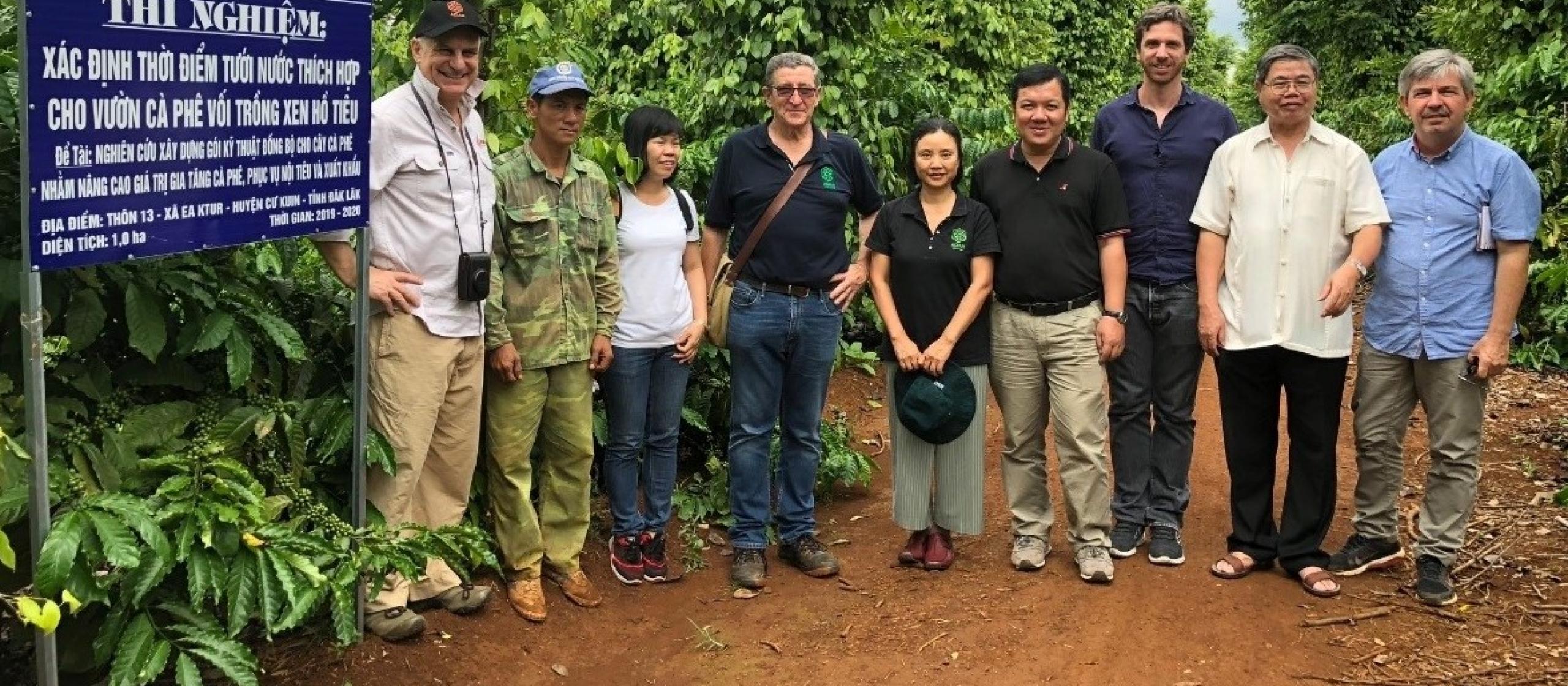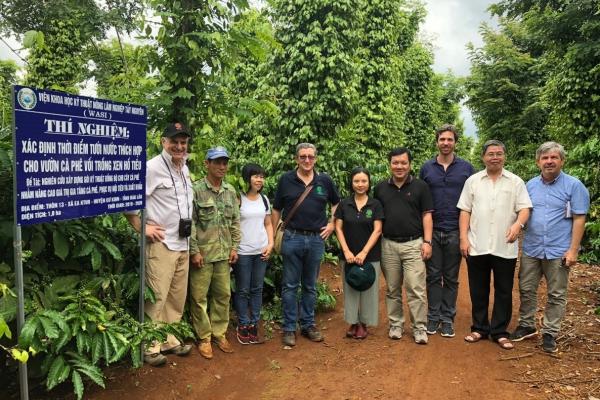- HomeHome
-
About ACIAR
- Our work
- Our people
-
Corporate information
- ACIAR Audit Committee
- Commission for International Agricultural Research
- Policy Advisory Council
- Agency reviews
- Executive remuneration disclosure
- Freedom of information (FOI)
- Gifts and benefits register
- Information publication scheme
- List of new agency files
- Contracts
- Legal services expenditure
- Privacy impact assessment register
- Commonwealth Child Safe Framework
- Benefits to Australia
- Careers
- 40 years of ACIAR
-
What we do
- Programs
- Cross-cutting areas
- Resources
- Where we work
-
Funding
- Research projects
- Fellowships
-
Scholarships
- John Allwright FellowshipScholarships to study in Australia for ACIAR partner country scientists to have Australian postgraduate qualifications
- ACIAR Pacific Agriculture Scholarships and Support and Climate Resilience Program
- Alumni Research Support Facility
- Publications
- News and Outreach
Date released
24 April 2020
Mr Tran Van Nhuong should be celebrating. The 39-year-old farmer living in the Central Highlands of Vietnam has just sold four tonnes of green coffee beans for a total equivalent to almost A$8,000.
That’s more than double the country’s annual minimum wage. However, half that money went to production costs, leaving the father of two with less than A$4,100 for the current crop year—a fraction of the amount he says he needs to support his family. In order to pay for basic needs, including food and healthcare, Mr Nhuong and his wife are forced to work on other farms after finishing with their own.
‘We are actually struggling with our life,’ he says. Mr Nhuong is the type of farmer two ACIAR small research activities (SRAs) are trying to help. Started in June 2019, one activity focuses on soil and land management and the other delves into stakeholder participation in agribusiness-led value chains— both for coffee and pepper.
Together, the year-long SRAs aim to explore holistic solutions that address the entire coffee and pepper value chains in the Vietnamese Central Highlands. With Vietnam ranked as the number one producer globally of both robusta coffee and pepper, the findings derived from the SRAs have the capability of benefiting more than a million smallholder farmers, many of them ethnic minorities.
‘Yes,’ says Mr Nhuong—he needs help with farming. ‘Not just my farm but for the entire coffee community,’ he adds.
Coffee and pepper struggles
When it comes to flavour and quality, robusta coffee has long come in second to its more popular cousin, arabica. Lately robusta, which is largely used for instant coffee, has been facing even greater challenges in Vietnam. According to local news agencies, smallholder farmers have been overproducing robusta, driving down its international market prices. Some farmers have even turned to overusing fertiliser in an effort to increase output. However, that has paradoxically resulted in reduced returns for coffee as disease outbreaks have proliferated. The increased popularity of mono-cropping and pesticides have only made the situation worse.
It is a similarly grim story for the king of spice. According to the state-run Vietnam News Agency, in 2019 pepper prices plummeted to as low as 40,000–45,000 Vietnamese dong (VND) (A$2.50–A$3.20) a kilogram—a steep drop from up to VND 260,000/kg (A$16.60/kg) that pepper commanded during its gold rush five years earlier.
‘I imagine the farmers are now struggling to shift to more resource use efficient practices because they have been extremely successful in intensifying their cropping systems over the past 30 years,’ says Dr Estelle Biénabe, one of the project managers for the “off farm” SRA and a senior agricultural economist at the French Agricultural Research Centre for International Development (CIRAD).
‘They have been extremely productive and are used to using a lot of products and resources to the extent that now they are exhausting their soil and overusing water.’
Dr Biénabe and her colleagues are facing an uphill battle. Two years ago up to 40% of the local coffee farmers were trading certified sustainable coffee but now that figure has dropped to about 20% despite companies’ continued commitment to the cause, notes the Vietnamese Institute for Policy and Strategy for Agriculture and Rural Development (IPSARD). Dr Biénabe says part of the reason is rising scepticism globally over how sustainability standards are being applied. So, to ensure accountability, landscape approaches to sustainable sourcing are being explored.
In the Vietnamese Central Highlands, a landscape approach is actively promoted through Verified Sourcing Area (VSA), where stakeholders ranging from local authorities to development agencies are starting to work together. Their aim is to establish locally adapted sustainability targets and verification schemes that will ideally be endorsed by private companies.
To ensure that the interests of farmers are protected, Dr Biénabe and her colleagues are looking at working with private companies to help farmers redesign their farming systems.
This includes providing advice on ideal locations for planting pepper as well as understanding intercropping dynamics to ensure better resource use efficiency. It also includes empowering farmers with the technical capacity to address pressing issues such as soil-borne pests and diseases. Mr Nguyen Cong Chinh, a 38-year-old Vietnamese coffee and black pepper farmer, says he’s struggling with root rot disease. ‘I need to understand more about biological control in pests and diseases. How does it work?,’ he asks. Before the researchers can help farmers like Mr Nguyen through piloting farm trials, Dr Biénabe and her colleagues are busy consolidating existing knowledge and data, including from companies, on soil, farming systems and value chains.
Unfortunately, progress is being hindered due to several factors. From the researchers’ perspective, one factor is that the data that companies do have are not necessarily robust since the information was collected for other purposes, says Dr Biénabe. The data might not include georeferences, and companies are reluctant to share sensitive information that might identify the specific farmers they are working with.
Another factor is the unforeseen need that private companies have for confidentiality agreements, which is taking time to negotiate. Nonetheless, at least one company has indicated an interest in engaging with ACIAR to work with researchers to improve value chains.
The world’s leader in flavour
McCormick & Company has sourced black pepper from Vietnam for more than 20 years. In its 2019 Purpose-Led Performance report, the US-headquartered company announced that by 2025 it would sustainably source 100% of its branded black pepper. ‘McCormick & Company has always been committed to doing what’s right for the communities where it sources its raw materials, and now we’re beginning to put that leadership at the forefront of our sustainability efforts,’ says Mr Gabriel Sarasin, a sustainability manager at McCormick.
In order to meet their goal, McCormick sources black pepper in Vietnam to ensure traceability back to farmers. This means the exporters McCormick works with are required to source an increasing proportion of black pepper directly from farmers. McCormick also works with other partners and suppliers to improve farmers’ agricultural practices and livelihoods. Mr Sarasin says a major problem for Vietnamese pepper farmers is maintaining good soil health to prevent pests and disease and increase yield.
But, due to a lack of research and development across the spice industry, there are not many effective solutions to address these issues. ‘We see a need to develop solutions across the industry and our partnership with ACIAR will be critical as we work to bring these solutions to farmers,’ Mr Sarasin says. After evidence-based best practices are identified they will be incorporated into McCormick’s supply chain.
ACIAR is currently working on formalising its relationship with McCormick, and Mr Sarasin sees the possibility of scaling up the current research program in the future. ‘The idea is to form a collaboration with ACIAR that will be not just for Vietnam but potentially broader in scope,’ he says.




